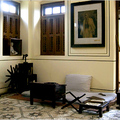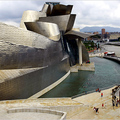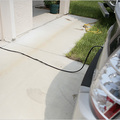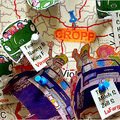
DRIVE At Outdoor Resorts Rancho California, Steven Beck and his ’57 Chevy golf cart.
THE sun was setting in the high desert mountains east of Los Angeles, meat was sizzling on the grill, and a throng of people milled around an outdoor kitchen, sipping red wine and laughing. The hosts of the party, Roger and Sandy Schield, circulated through the crowd, topping off glasses, shooting jokes and putting out platters of food to keep the mood light.
Some guests were sitting on plush chairs next to the rock fireplace, while others gazed at the flat-screen TV, sat at the bar or ambled over to the artificial waterfall.
It could have been a party in the backyard of any upscale home except for one thing: This was an RV park.
Gone are the days when recreational vehicle parks were rustic campgrounds with dirt roads, wooden picnic tables and a single pay phone. Now many of them, like Outdoor Resorts Rancho California, in Aguanga, in Southern California, where the Schields own a lot, resemble country clubs, with their manicured lawns, golf courses, clubhouses, swimming pools and tennis courts. Some parks are going even further and adding water slides, spas, restaurants and summer camps for children.
“Campers expect a Ritz-Carlton type of experience,” said Randall Henderson, founder of Outdoor Resorts of America and president of resort development at Monaco Coach, a recreational vehicle manufacturer based in Coburg, Ore.
Parked behind the Schields’ open-air kitchen, bar and living room is their 40-foot-long RV. Outfitted with granite countertops, satellite television and a washer and dryer, it sits on a 3,800-square-foot lot the couple bought and remodeled last year. Their “neighborhood” is lined with similar vehicles, which cost anywhere from $250,000 to $1.4 million.
“All the owners get to play golf for free,” said Mr. Schield, 70. “How many places can you do that? You can’t. When it comes down to it, it’s the peacefulness and the quiet of the area that draws us here.”
He is at the resort most of the time, while Mrs. Schield, 60, visits a few weekends a month.
WHILE there are RV parks across the country, most of the upscale ones are in places where there are a lot of second homes, like Nevada, Florida, Texas and Southern California. The Buckhorn Lake Resort in Kerrville, Tex., added covered RV storage last month and will open guest cottages with private patios in the fall. At Elk Meadow Lodge and RV Resort in Estes Park, Colo., there are outdoor chuckwagon dinners with comedy shows and dances this year.
Industry representatives say residents of high-end parks like these are changing what it means to travel in an RV. Hitting the road means taking all the amenities of home with them, like cable television and Internet access. It’s a sharp difference from the experiences of their parents, who often liked to pitch a tent and camp in the woods.
“The W.W. II generation was used to going without, and they knew how to do things, or at least they weren’t afraid of cooking over a fire,” said Linda Profaizer, president of the National Association of RV Parks and Campgrounds in Falls Church, Va. “Baby boomers want everything to be fed to them, and they want it to be easy.”
The lifestyle in these parks doesn’t come cheap. A parking spot, which can be a plain concrete pad or have “build outs” like an outdoor kitchen and bar, can cost $68,000 to $280,000. At Aguanga, a concrete pad generally sells for $80,000 to $120,000. A monthly fee of $330 includes daily trash pickup, water, sewer, cable TV and golfing for members. Owners can rent out their lots when they’re not there for $55 a night.
The prices haven’t made owners at Rancho California flinch. After spending $1.4 million for a custom-built motorhome last year, Susan and Hank Thomas of Carson City, Nev., thought nothing of paying $236,000 for two lots at Aguanga. With their rig’s polished stainless-steel body and roof-wrapping windows, it’s easy to see why they wanted an equally upscale parking spot.
“What makes it nice is that you’re outdoors and meeting people. You could buy a second home, and you’d never meet your neighbors,” said Mrs. Thomas, 60, in her black Dior sunglasses. “There’s nothing like it.”
Even campground operators who cater to travelers with tents and truck trailers have been upgrading their parks, many of which were built when Nixon was president. They’re widening and lengthening sites so big rigs, which top out at 60 feet with a towed car, can fit, and upgrading electrical systems to power RVs’ air-conditioners, washing machines, televisions and stoves.
Kampgrounds of America, one of the country’s oldest operators, has been going upscale, adding dog parks, jumping pillows, splash pads, swimming pools, exercise classes, patios and campfire pits to some of its 450 parks. This year, it is rolling out its own brand of coffee and cafes.“We have to be all things to all people,” said Mike Gast, KOA’s spokesman.
That is what the Schields want on their weekends. A few weekends a month, Mrs. Schield drives her Mercedes convertible 143 miles from their home in Thousand Oaks, Calif., where she works as an assistant to an executive at Amgen, to visit her husband, a retired private equity manager, and their two big dogs. When she gets there, she wants to sleep in or visit with friends.“I love cooking out in the open and talking to people as they walk by,” she said.
If she wants to do something else, there are always impromptu parties at the other lots. People zoom around the park on golf carts, winding around the golf course and palm trees, waving and smiling at everyone. Invitations for cocktails and dinner come easily.
The parties and chatty people convinced Ann Marie and Steven Beck, who live in nearby Lake Elsinore, to buy a lot at Rancho California. They’ve quickly collected a lot of new friends as they drive around the park in their golf cart with their dog, Jessie J. With its purple fins and orange flames painted on the side, the cart resembles a 1957 Chevy Bel Air.
“I know more people here than I do at home,” said Ann Marie Beck, 51. “There’s always a party going on.”
Family and friends who don’t own motorhomes are also invited. The Schields’ two sons come down a few times a year and they often go on trips together in the RV. But like many visitors, they weren’t such fans at first. “We told our kids we were buying an RV, and they said, ‘Oh great, you guys are officially old,’ ” Mr. Schield said.
With lofty gasoline prices, many of the owners at Rancho California, with full-time jobs and children, are staying longer and driving less. (Motorcoaches on average get only 8 to 10 miles a gallon, according to the Recreation Vehicle Industry Association.) This means that owners are turning their RVs into more or less stationary weekend homes, and the amenities are even more important.
Bill and Carolyn Dalton, who live in Temecula, 18 miles to the west, sold their second home south of Palm Springs when they grew lonely and bought a lake-view lot at Rancho California in April for $115,000. Over the last few months, they have planted palm trees and grass and have built a thatch-covered bar that reminds them of a Mexican beach resort.
They come nearly every weekend, often with friends, and now prefer staying in their RV to being at home. Even vacations pale compared with life at their lot.
Mr. Dalton, 62, said, “We come back from vacation, cook a few steaks and ask each other, ‘Why did we leave?’ ”






